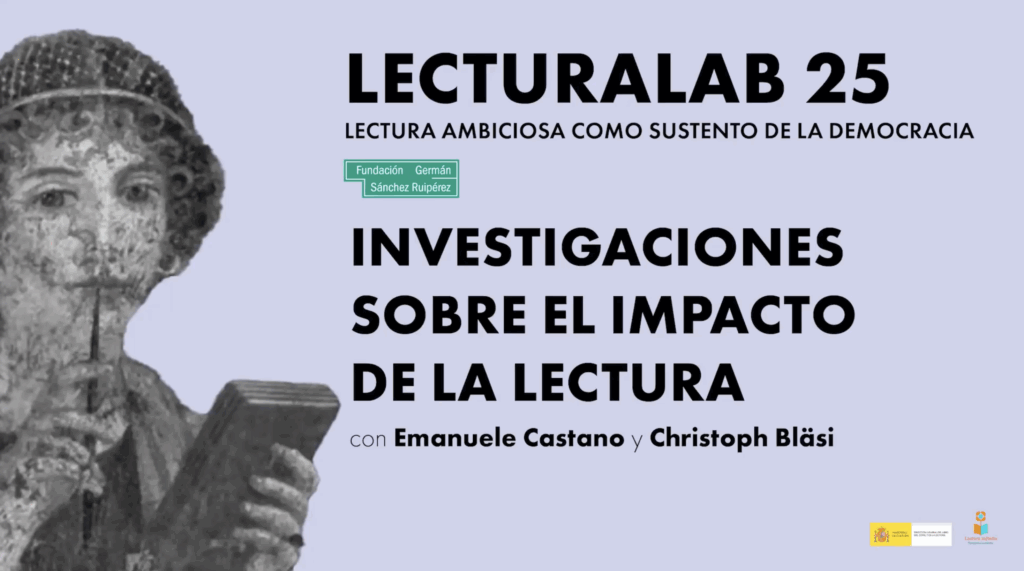And something is moving. The 2025 edition of LECTURALAB 25 took place last month. A forum dedicated to exploring different dimensions of reading each year, from an innovative and unconventional perspective. This is organised by the GSR Foundation in Madrid and attracts many professionals of reading promotion and the publishing industry.
LECTURALAB 25 unfolded as a multilayered conversation about the future of reading and its profound role in sustaining democratic life. Across its sessions, speakers highlighted a shared conviction: in a world marked by accelerating digital saturation and democratic fragility, ambitious reading – deep, reflective, structurally demanding reading – has become not just a cultural activity but a civic necessity.
Wilfried Admirall and Kristenn Einarsson presented two European initiatives currently underway that we are working on. «DemRead» aims to weave high-level reading into the core of Citizenship Education, treating it as a structural component rather than an optional enrichment. «DemRead Boost» goes a step further by building a network of cities across Europe that will co-design reading programmes and establish youth councils linking reading and civic participation. Both projects share a mission: to translate research on deep reading into practical tools that can strengthen democratic culture across the continent.
The urgency behind these efforts was underscored by instructive data. As Einarsson noted, recent figures from the V-Dem Institute show that liberal democracies are now in the global minority, while freedom of expression declined in dozens of countries last year alone. Against this backdrop, the Lillehammer model – where reading is deliberately placed at the centre of public life – serves as a powerful reminder that reading communities can help sustain democratic values.
During the second session, I shared the stage with Miha Kovač to explore the cultural and symbolic barriers that still distance many people from high-level reading. I recalled focus-group research in which non-readers described the «typical reader» as a wealthy, older man surrounded by leather-bound books. I usually mention this stereotype because it reveals the persistent notion of reading as an elitist practice, historically linked to power and privilege. Dismantling these associations is essential if ambitious reading is to be understood as accessible and necessary for everyone.
Kovač brought a compelling empirical dimension to this discussion. Drawing on international literacy data, he highlighted a striking correlation: the countries whose adult populations are most proficient at reading long, complex texts are also the most innovative and the most democratic. High-level reading, innovation and liberal democracy tend to rise and decline together. For Kovač, this relationship reinforces the need to defend demanding reading practices at a time when cultural attention is shifting elsewhere.
We emphasised the transformative potential of literary fiction in particular. Fiction nurtures empathy, perspective-taking and strategic thinking capacities essential not only for personal growth but for democratic coexistence. Studies even show that many leaders in the tech sector come from humanities backgrounds, suggesting that narrative understanding remains central in an era dominated by digital technologies.
Later, Emanuele Castano described a historical shift: whereas stories once served mainly to bind communities together, literary fiction now also invites readers to expand their empathy beyond their immediate group. By introducing ambiguity, nuance and multiple perspectives, such fiction challenges narrow identities and opens space for concern for minorities and human rights.
Christoph Bläsi, meanwhile, argued for greater precision when speaking about the benefits of reading. Not all reading practices produce the same effects, he noted, and understanding their «signatures» is crucial. Listening to an audiobook while jogging, for example, is cognitively distinct from reading a complex text on paper. Mapping specific outcomes — such as empathy or analytical thinking — to specific reading situations is key to designing effective educational and cultural policies.
Together, Castano and Bläsi outlined ongoing research that aims to test the link between ambitious reading and a democratic mindset empirically. By observing how different reading practices influence students’ openness to dialogue, trust in institutions and civic engagement, researchers hope to build evidence that can inform curriculums, teacher training and youth programmes.
LECTURALAB 25 concluded not with definitive answers but with a clearer sense of direction. If reading is to support democratic life, it is not enough to say that «reading is good». We must understand «what» we read, «how» we read and «why» certain forms of reading matter more than ever. In that understanding lies a path – perhaps not the only one, but an essential one towards a more democratic future.

